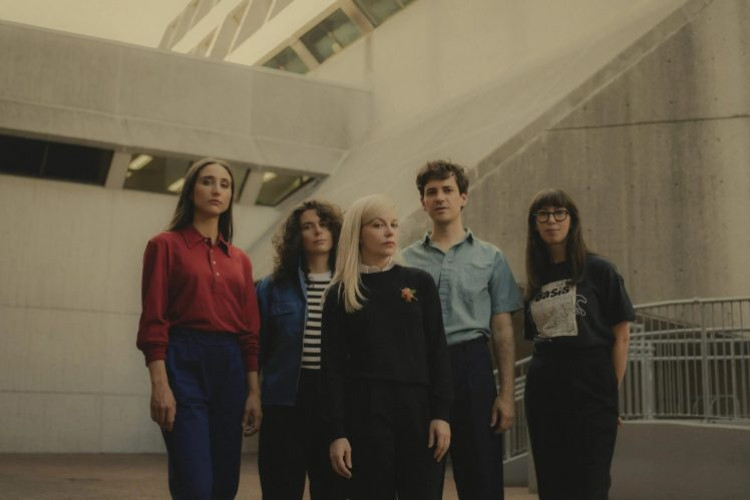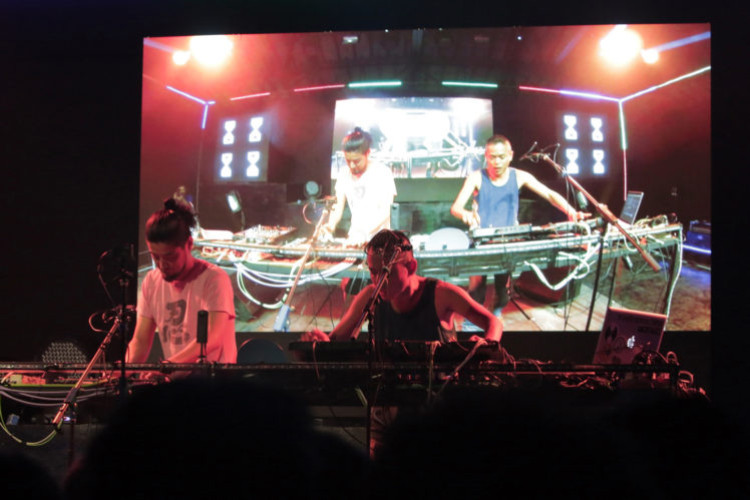
Mong Tong: “For most Westerners, we are part of world music, an alien.”
During Joyland Festival Bali 2024, we conversed with the Taiwanese psychedelic band of brothers, Mong Tong, on their creative direction around Occultism, the Taiwan music scene, and their mysterious third member.
Words by Whiteboard Journal
Text: Garrin Faturrahman
Photos: Samuel Evander/Whiteboard Journal
Hailing all the way from Taiwan came Mong Tong, and the band of brothers’ brought their mysteriously haunting psychedelic sounds down to Joyland Festival Bali 2024, striking awe to those who were lucky enough to watch them live at the Lilypad Stage.
The band are not only best known for being part of a label with another psychedelic giant, Kikagaku Moyo, but also their characteristic getup where blindfolds are a must in their wardrobe. However, we were also lucky enough to be given the chance to converse with them around topics like Occultism, the fetishization of Asian sounds, to their peculiar “third member”, all sans blindfold.
I recognize the two Chinese characters which could mean “Dream” and “East” respectively, and I’ve also found that your name has different meanings in Burmese, Cantonese, and Chinese. Can you please tell us your story behind your name, “Mong Tong 夢東”?
Jiun Chi: Well, actually we’re not giving [it] a certain definition. So every time we go to a newer place with different languages, we always ask this question: “What does Mong Tong mean in your own language?” I think it’s a fruit in Indonesia?
Durian monthong?
Jiun Chi & Hom Yu: Yeah, durian! Durian monthong.
Jiun Chi: So, last time we went to Thailand, they said Mong Tong is like gold-looking. Different countries have different meanings, so I think that’s what makes this concept meaningful. [Written as mon thong in Thai – Ed.]

A durian monthong. (Photo: AEON)

A durian monthong/หมอนทอง. (Photo: gowithstock/Shutterstock)
The two of you are here today as Mong Tong. However, I’ve read about the “mysterious third member.” Do they do sampling and vocals?
Jiun Chi: Well, actually he’s doing maybe music videos and the concept behind these stuff. But he’s not playing anything, you know, musical. So there is a certain matter, but he never showed up.
What do you wish to convey with the addition of this “third member” of yours that goes by the Chinese character “仝” that… how do you read this… tong?
Jiun Chi: Tong! I think it means the same, but it’s a really old Chinese character so nobody uses that anymore. But it looks like an A with an I, AI, so maybe AI is the third member, I don’t know.
I read that Jiun is part of a lush dream-pop band, Fogbow, and a no wave band called PA66, while Hom is playing in a thrash metal band, Mutation 突變異種. That’s a huge palette of genres that you are playing in! How do you separate yourself when you have to jump between bands?
Hom Yu: Our album, Tao Fire 道火, the intro we use metal riff and so we mix the genre in our music.
Jiun Chi: Yeah, for me, like PA-66, Fogbow is something from a long long time ago so I don’t really jump between genres but I am trying to make music I like- I don’t hate. I don’t know exactly what I like, but I do know I hate a certain kind of thing.
By the way, which “sound” do you resonate best with?
Hom Yu: I think it’s the sound from nature, maybe woods, or birds, or ice. Ice, ice cracking sound.
Jiun Chi: Yeah, for me, I also like the traditional music instruments, such as in Indonesia, like gamelan. That’s one of my favorites, actually.
You are collaborating with the Hong Kong-based cowboy-inspired guitar outfit, Gong Gong Gong, and I feel that the fusion of you guys is a destined one. What do you see from this overseas collaboration?
Jiun Chi: Well, it’s how we make friends. We tour around the world and make new friends with musicians, composers, and to be honest I really enjoy working with them. So how do I see this… joyful? Joyland, right? Haha.
I think one of the best things about this is you can try something really different because it’s a different musician with a different mindset so there is always something new if you do it in collaboration. One way to not to get trapped.
So in a creative sense, it also does help you explore.
Jiun Chi: Yeah. Especially if you are working with people from different cultures, then you will learn a lot. I think you need to respect the culture in order to collaborate with them.
Speaking of culture, I’ve also seen that you are very acquainted with Occultism. Coming from Indonesia, where Occult is also a big thing in our lives, we can understand that superstition follows (or even guides) us wherever we go. How much of a role does Occultism play in your arts?
Jiun Chi: How big? The percentage? I think maybe even 50% or over 60%. I think this is our purpose to promote ourselves in Europe. Because at the beginning, we were trying to promote ourselves in Europe, so that’s why we were released by a label from Europe, So that’s why we were released by a group of bands, another label from Europe. And they are trying to promote Asian culture.
So that’s why this occult thing is so heavy in our music because, I think this word in English has a negative meaning, right? Well, if compared to Christianity, the opposite of Christianity is Occult. Which means for most Westerners, we are part of world music, a part of an exotic…
Alien, maybe?
Jiun Chi: Yeah, alien. So, that’s in their perspective, right? But actually I hate these meanings because we have our own culture. Why do you need to judge us, right? So that’s why we are trying to maybe flip this idea through a cult?
So, yeah, that’s why the percentage is so high in our music. Because this represents our culture.
Still on culture, with how you bring yourselves (and your songs) out into the world, I feel a sense of a nonconforming nature within Mong Tong. Does that mean that the Taiwanese music scene is a vibrant place where creative exploration blooms freely? What is it like over there?
Jiun Chi: Yeah, pretty free. We have a lot of different festivals, different genres, and even like the mainstream music industry, a lot of independent musicians in that industry. And you know, there’s mainland China, and compared to China, we have a diversity in Taiwan, different musicians. But I think it’s still hard to make music as your business in Taiwan. It’s competitive because a lot of different people make music.
But I think we are still pretty strange in Taiwan, you know? Because I don’t think there’s anyone like us in Taiwan. This band is more like, okay, we travel around, but not in Taiwan. So, yeah, I think most of the people in Taiwan don’t understand us so well.
As a part of a curated act by Wok the Rock, did you catch a hint of how the Indonesian music scene looks like? How does it compare to Taiwan?
Jiun Chi: I do know some, like, Indonesian experimental musicians. Because that’s why I met Wok The Rock. Because he curated a show? No, not a show… a stage in Taiwan last month. It’s about his short movie. The only Indonesian musicians I know are doing noise music in Taiwan. So it’s a really good chance to perform for us, to be in Bali. So especially, actually you see we’ve been in different bands before, right?
View this post on Instagram
So the last thing I’ve been, the last one I’ve been with is all these like noise musicians, like experimental musicians, so I know them pretty well. That’s how I met these Indonesian noise artists.
Does KUNTARI fit the noise group?
Jiun Chi: KUNTARI! I like this band. They went to Taiwan last year. Yeah, I saw the show. And they start to tour in Europe as well, right? Yeah, I hope they have success.
Your songs feature a wide range of samples. I was pretty inspired by the sampling approach of the Japanese enigma, Cornelius, where he tried to encapsulate the feeling of his childhood. What do you see from the use of samples in your songs?
Jiun Chi: Well, I don’t know his music very well, but I think we learned this skill from hip-hop music, like from the early American hip-hop artists, they also sampled their old records, disco funk, to get that vibe into their newer version of old music, I would say, and put in something really new like rapping on the old pieces. I think the way we use samples is like updating the newer version of traditional music. Like, yeah, there’s iPhone 13, yeah, but traditional music? Please update, right? Haha.
What’s next for Mong Tong?
Jiun Chi: Next week we are headed to SXSW in Austin, then we’ll start our US tour. And also we will release a new EP called Epigraphy, via this label in the US called No Gold. So I think, this year, what’s next, I can only imagine this year we will still tour around the world, maybe Korea, maybe Japan, maybe China, and then we’re back to Europe. So, a pretty busy year.
Sounds fun!
Jiun Chi: Yeah, sounds fun, but tiring.
Wait, so you guys have three labels in Europe, US, and Japan? The one with Kikagaku Moyo?
Jiun Chi: Yeah! Kikagaku Moyo. This is Kikagaku Moyo’s t-shirt.

(Credits: MM Ridho/Whiteboard Journal)

(Credits: MM Ridho/Whiteboard Journal)

(Credits: MM Ridho/Whiteboard Journal)
So, you said we have a wide range of collaborations in different countries, so we also have a wide range of different collaborations with different labels. So, yeah, please if you know some good Indonesian musicians like us, please introduce them to us.
Ridho: Any band? I would recommend you Fuzzy, I, and then Kinder Bloomen. And if you like, Rollfast…
Jiun Chi: Yeah, yeah, Rollfast!
Ridho: …they’ve just changed their name to Gangsar. They’re actually playing right now.
Jiun Chi & Hom Yu: Huh? What?
Garrin: It’s time to go?
Jiun Chi & Hom Yu: Go, go!
[We then all stormed out]











